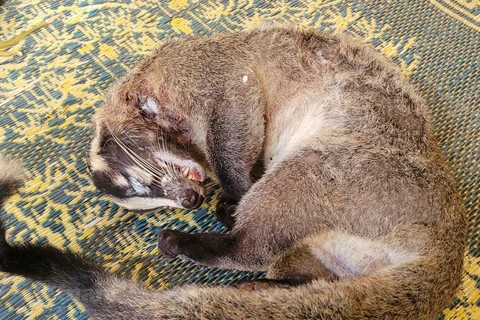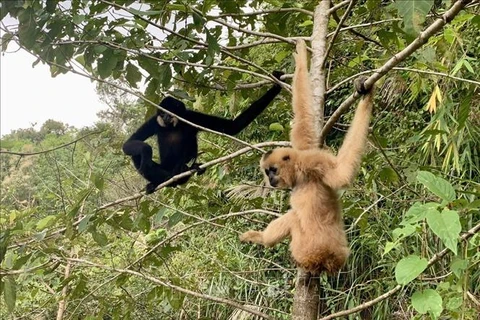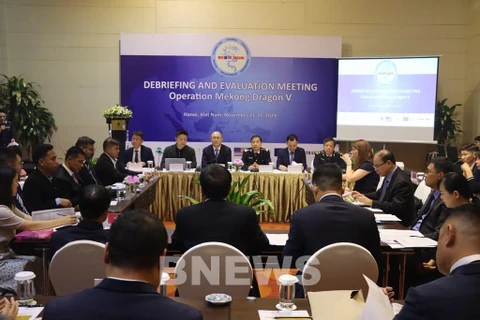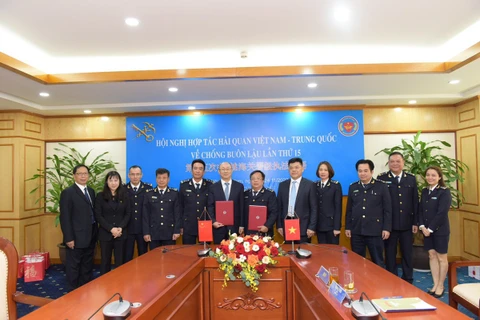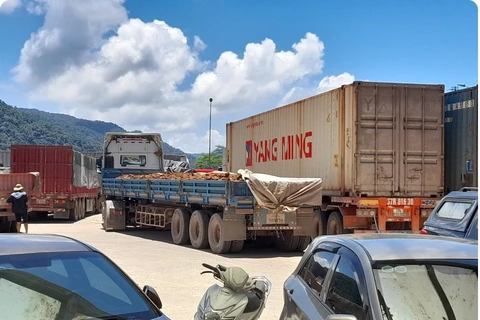 At a meeting on forest protection between the forest ranger forces of Vietnam and Laos. (Photo: VNA).
At a meeting on forest protection between the forest ranger forces of Vietnam and Laos. (Photo: VNA). Hanoi (VNA) - A group of more than 10 people dropped by a restaurant near the border, and received recommendations from the owner to have wild animal meat for lunch. Contrary to the majority of the diners, a young girl resolutely refused the dishes, arguing that eating wild animals means harming the environment and the community, “including us”.
“But they already hunted the animals, whether you are eating them or not does not change the fact that they are dead. I don’t get the difference,” said the restaurant owner.
“What you don’t know is everything is related to each other. If you don’t eat them, people will not sell them anymore, and then the hunters will stop hunting them,” the girl said with certainty. Agreeing with the girl’s arguments, the group changed their choice to chicken and stream fish, which they described as a “delicious, healthy and affordable” meal.
If all consumers could say “no” to products from wild animals like the girl that VietnamPlus reporters met at the restaurant that day, the demand for wildlife products would be reduced significantly, thus putting an end to wildlife trafficking.
Consumer commitments to erasing wildlife trafficking is one of the key factors to combat the crime, along with support from authorities, international partners, as well as the media, securing a greener Vietnam for future generations.
The illegal transport and trading of wild animals from other countries to Vietnam as well as domestic smuggling have led to an increased risk of extinction of many endangered wild animal species. The practice poses a negative impact on the environment and introduces novel infectious diseases to humans. This is an alarming problem that needs a drastic and substantive "response" to solve.
However, the prevention and combat of wildlife trafficking have faced many difficulties as reported by authorities from the majority of sectors.
Le Mai Anh is head of the customs control team under the Customs Sub-Department of Quang Tri province, which borders Laos. Since May 2022 after the Lao Government fully reopened its border with Vietnam, the illegal smuggling and transport of goods, including banned goods, take place in a complex manner, posing many risks and challenges.
Quang Tri shares long road and river borders with Laos, with two international border gates of Lao Bao and La Lay, and four auxiliary border gates (Coc, Thanh, Cheng and Ta Rung), along with trails and crossings. Meanwhile, the customs control force is still thin and understaffed, so the control work is very difficult, anh said.
Statistics from the Quang Tri Customs Sub-Department showed that since 2020, local authorities discovered 33 cases of illegal trading, keeping and transporting of wild animals, seizing 186 animals weighing 397.9 kilogrammes.
Of the total, 21 cases involving 161 animals with a total weight of 325.2 9 kilogrammes were trans-border trafficking from Laos to Quang Tri. Popular wild animals that are illegally transported and traded by smugglers are pangolins, lizards, monkeys and turtles.
Like Quang Tri, other localities such as Quang Binh and Ha Tinh have reported complex wildlife trafficking problems.
The Forest Protection Department of Vietnam and the Department of Forest Inspection of Laos held a meeting recently to evaluate the implementation of their MoU to prevent trafficking. At the event, the two sides agreed to strengthen collaboration in preventing the illegal transport and trading of rare animals and plants through the border.
However, according to Vuong Tien Manh, Deputy Director of the Vietnam CITES Management Authority, underlined the need for “international pressures” such as reports on the situation to prompt the two sides to take stronger actions.
Trinh Le Nguyen, Executive Director of PanNature, held that law enforcement agencies of Vietnam and Laos should design tighter cooperation programmes to increase the inspection and control of wildlife species.
According to Nguyen, as the two countries share a border in which many wild animals live and move across, Vietnam and Laos are a common habitat of many wild species. Therefore, the loss and decline of wild species in any country will affect the biodiversity of both sides, thereby affecting global biodiversity.
Leaders of the Quang Tri Forest Protection Sub-Department underlined that in the future, it will develop regulations on coordination in management and protection of forests in the border area between Quang Tri and Savanakhet and Saravane provinces of Laos. The department will regularly strengthen the management and prevention of wild animal consuming, selling, hunting and transporting on the border.
The force will also work with the border guard and customs forces as well as other relevant agencies in the work, they said.
Along with the "responsible handshake" among authorised forces, the coordination of specialised agencies in bordering provinces of Vietnam and Laos in management and prevention of wildlife trafficking is also needed.
A recent conference was held to evaluate the implementation of recommendations from National Assembly on the realisation of policies and laws regarding the Convention on International Trade in Endangered Species of Wild Fauna and Flora (CITES). Vice Chairman of the NA Committee for Science, Technology and Environment Nguyen Thi Le Thuy stressed that as one of the earliest signatories of the CITES, the Vietnamese NA commits to working harder for better performance of Vietnam in the field.
Along with the efforts by authorities, deeper knowledge and awareness of the community is crucial to put an end to demands for wildlife products, which is the root of the illegal hunting, trafficking, transporting and trading of wild animals./.
